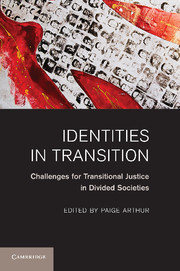Book contents
- Frontmatter
- Contents
- Acknowledgments
- Author Bios
- Introduction: Identities in Transition
- PART I IDENTITY IN TRANSITIONAL JUSTICE MEASURES
- 1 Indigenous Peoples and Claims for Reparation: Tentative Steps in Peru and Guatemala
- 2 Truth Telling, Identities, and Power in South Africa and Guatemala
- 3 Security System Reform and Identity in Divided Societies: Lessons from Northern Ireland
- 4 Staging Violence, Staging Identities: Identity Politics in Domestic Prosecutions
- 5 International and Hybrid Criminal Tribunals: Reconciling or Stigmatizing?
- 6 Silences, Visibility, and Agency: Ethnicity, Class, and Gender in Public Memorialization
- PART II IDENTITIES, TRANSITION, AND TRANSFORMATION
- Index
2 - Truth Telling, Identities, and Power in South Africa and Guatemala
Published online by Cambridge University Press: 01 March 2011
- Frontmatter
- Contents
- Acknowledgments
- Author Bios
- Introduction: Identities in Transition
- PART I IDENTITY IN TRANSITIONAL JUSTICE MEASURES
- 1 Indigenous Peoples and Claims for Reparation: Tentative Steps in Peru and Guatemala
- 2 Truth Telling, Identities, and Power in South Africa and Guatemala
- 3 Security System Reform and Identity in Divided Societies: Lessons from Northern Ireland
- 4 Staging Violence, Staging Identities: Identity Politics in Domestic Prosecutions
- 5 International and Hybrid Criminal Tribunals: Reconciling or Stigmatizing?
- 6 Silences, Visibility, and Agency: Ethnicity, Class, and Gender in Public Memorialization
- PART II IDENTITIES, TRANSITION, AND TRANSFORMATION
- Index
Summary
In the mid-1990s, South Africa and Guatemala were among some seventeen countries that had instituted truth-telling initiatives in the form of truth commissions to examine past political conflict and violence. By the end of 2008, this number had almost doubled, with several more waiting in the wings.
The first Latin American truth commissions were organized to respond mostly to state-directed violence toward individuals. Subsequent truth commissions, including those explored here, generally operated in more varied and fractured settings, where severe and multiple inequalities running along the tracks of race, ethnicity, region, religion, or class had been politically mobilized and had formed a key factor in political violence and human rights abuses. These latter contexts have placed a far greater burden of expectation on truth commissions in delivering wider social transformation, including the creation of democratic practices and a more inclusive citizenship.
The subsequent failure of these societies to resolve divisive forms of identity or identification, or to effect social transformation, has frequently led to criticism of the individual-human-rights-violation approach in such societies, and more widely of truth commissions themselves. One strand of criticism has focused on questions of reconciliation, for which the key point of judgment is whether South Africa or Guatemala has successfully reconciled the parties to the conflict. In these assessments reconciliation is not understood simply as being between victim and perpetrator but in terms of ethnic or racial identity – black/white or Mayan/Ladino. The second set of assessments is driven by the apparent endurance of structural and systemic forms of violence at an economic level.
- Type
- Chapter
- Information
- Identities in TransitionChallenges for Transitional Justice in Divided Societies, pp. 54 - 86Publisher: Cambridge University PressPrint publication year: 2010
- 4
- Cited by

